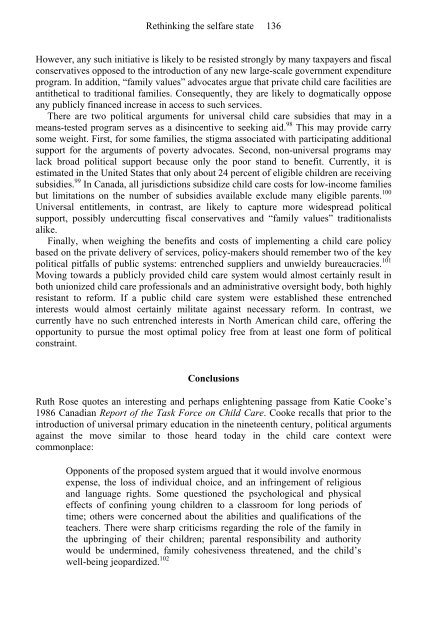Rethinking the Welfare State: The prospects for ... - e-Library
Rethinking the Welfare State: The prospects for ... - e-Library
Rethinking the Welfare State: The prospects for ... - e-Library
Create successful ePaper yourself
Turn your PDF publications into a flip-book with our unique Google optimized e-Paper software.
<strong>Rethinking</strong> <strong>the</strong> selfare state 136<br />
However, any such initiative is likely to be resisted strongly by many taxpayers and fiscal<br />
conservatives opposed to <strong>the</strong> introduction of any new large-scale government expenditure<br />
program. In addition, “family values” advocates argue that private child care facilities are<br />
anti<strong>the</strong>tical to traditional families. Consequently, <strong>the</strong>y are likely to dogmatically oppose<br />
any publicly financed increase in access to such services.<br />
<strong>The</strong>re are two political arguments <strong>for</strong> universal child care subsidies that may in a<br />
means-tested program serves as a disincentive to seeking aid. 98 This may provide carry<br />
some weight. First, <strong>for</strong> some families, <strong>the</strong> stigma associated with participating additional<br />
support <strong>for</strong> <strong>the</strong> arguments of poverty advocates. Second, non-universal programs may<br />
lack broad political support because only <strong>the</strong> poor stand to benefit. Currently, it is<br />
estimated in <strong>the</strong> United <strong>State</strong>s that only about 24 percent of eligible children are receiving<br />
subsidies. 99 In Canada, all jurisdictions subsidize child care costs <strong>for</strong> low-income families<br />
but limitations on <strong>the</strong> number of subsidies available exclude many eligible parents. 100<br />
Universal entitlements, in contrast, are likely to capture more widespread political<br />
support, possibly undercutting fiscal conservatives and “family values” traditionalists<br />
alike.<br />
Finally, when weighing <strong>the</strong> benefits and costs of implementing a child care policy<br />
based on <strong>the</strong> private delivery of services, policy-makers should remember two of <strong>the</strong> key<br />
political pitfalls of public systems: entrenched suppliers and unwieldy bureaucracies. 101<br />
Moving towards a publicly provided child care system would almost certainly result in<br />
both unionized child care professionals and an administrative oversight body, both highly<br />
resistant to re<strong>for</strong>m. If a public child care system were established <strong>the</strong>se entrenched<br />
interests would almost certainly militate against necessary re<strong>for</strong>m. In contrast, we<br />
currently have no such entrenched interests in North American child care, offering <strong>the</strong><br />
opportunity to pursue <strong>the</strong> most optimal policy free from at least one <strong>for</strong>m of political<br />
constraint.<br />
Conclusions<br />
Ruth Rose quotes an interesting and perhaps enlightening passage from Katie Cooke’s<br />
1986 Canadian Report of <strong>the</strong> Task Force on Child Care. Cooke recalls that prior to <strong>the</strong><br />
introduction of universal primary education in <strong>the</strong> nineteenth century, political arguments<br />
against <strong>the</strong> move similar to those heard today in <strong>the</strong> child care context were<br />
commonplace:<br />
Opponents of <strong>the</strong> proposed system argued that it would involve enormous<br />
expense, <strong>the</strong> loss of individual choice, and an infringement of religious<br />
and language rights. Some questioned <strong>the</strong> psychological and physical<br />
effects of confining young children to a classroom <strong>for</strong> long periods of<br />
time; o<strong>the</strong>rs were concerned about <strong>the</strong> abilities and qualifications of <strong>the</strong><br />
teachers. <strong>The</strong>re were sharp criticisms regarding <strong>the</strong> role of <strong>the</strong> family in<br />
<strong>the</strong> upbringing of <strong>the</strong>ir children; parental responsibility and authority<br />
would be undermined, family cohesiveness threatened, and <strong>the</strong> child’s<br />
well-being jeopardized. 102


